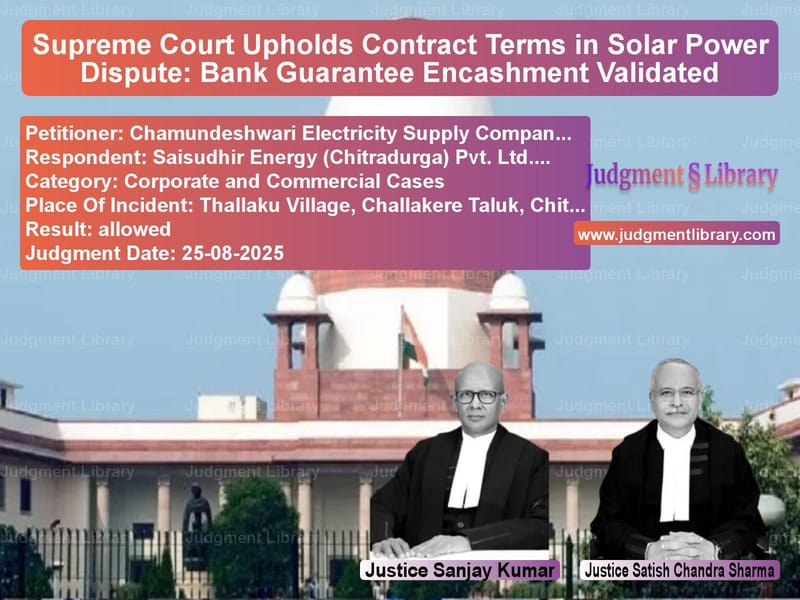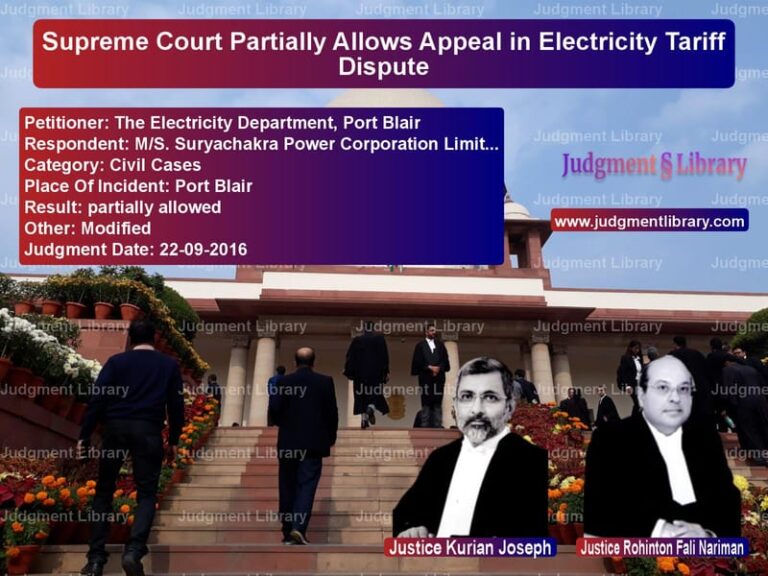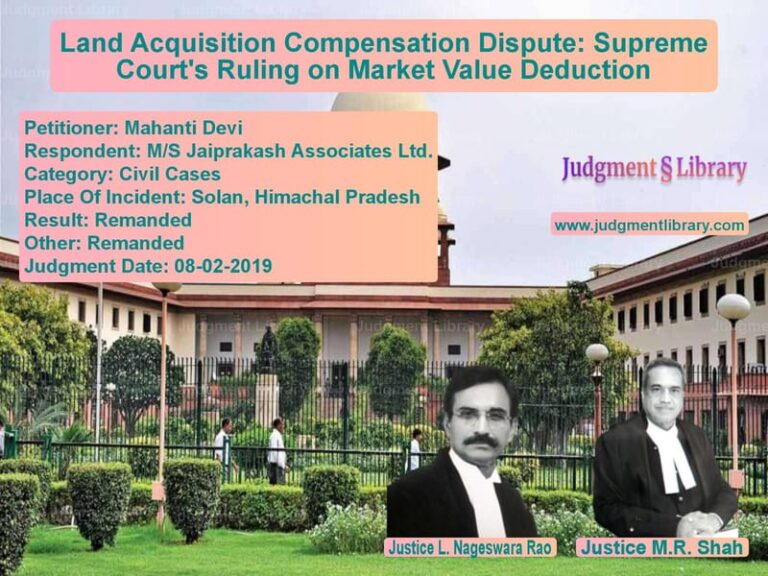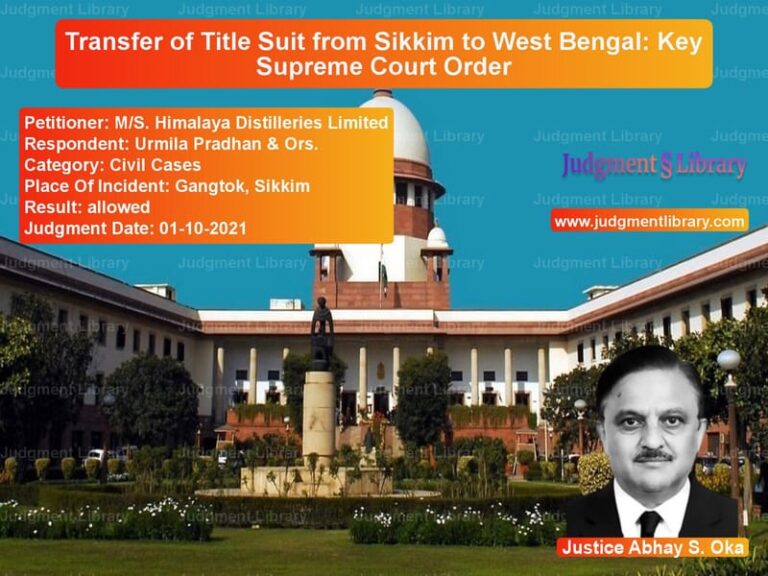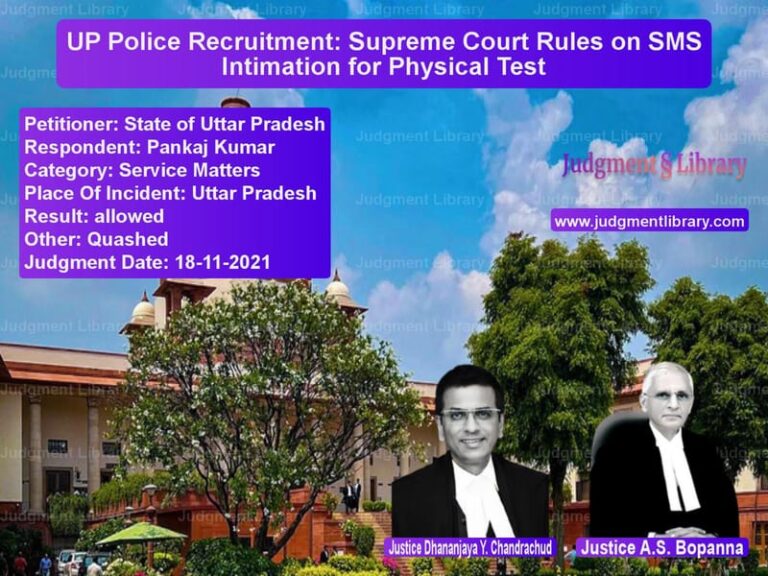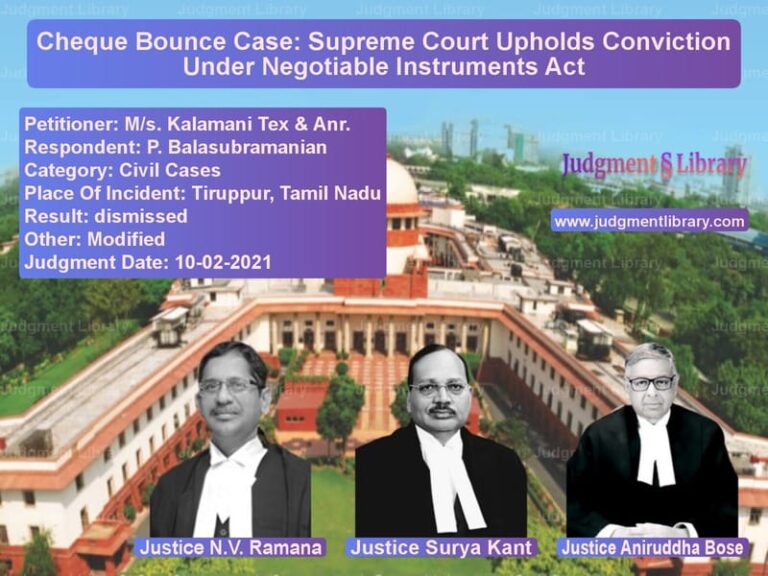Supreme Court Upholds Contract Terms in Solar Power Dispute: Bank Guarantee Encashment Validated
In a landmark judgment that reinforces the sanctity of commercial contracts, the Supreme Court of India recently delivered a decisive verdict in a complex dispute between a state-owned electricity distribution company and a private solar power developer. The case, which revolved around a Power Purchase Agreement (PPA) for a 10 MW solar project in Karnataka, highlights the critical importance of adhering to contractual procedures and timelines in commercial agreements, even when dealing with government entities.
The dispute began when Chamundeshwari Electricity Supply Company Limited (CESC), a distribution licensee wholly owned by the State of Karnataka, entered into a PPA with Saisudhir Energy (Chitradurga) Pvt. Ltd. for procurement of solar power at a tariff of Rs. 8.49/kWh. The agreement, executed on August 30, 2012, required the developer to achieve Commercial Operation Date within 12 months from the effective date, preceded by satisfaction of “Conditions Precedent” within 240 days. These conditions included acquiring land, securing statutory approvals, achieving financial closure, and entering into connectivity agreements.
The Core Dispute
The heart of the conflict lay in the delay of the evacuation system – the transmission lines necessary to carry the generated power to the grid. The evacuation scheme prepared by Karnataka Power Transmission Corporation Limited (KPTCL) required commissioning of two specific 220 kV double-circuit transmission lines. However, these lines were not completed within the contractual timelines, making it technically impossible for the developer to synchronize and inject power into the grid.
Due to the inability to evacuate the contracted power, CESC claimed to have procured power from alternate sources at higher rates, incurring losses to the tune of Rs. 48.65 crores. The developer, on the other hand, faced encashment of the performance bank guarantee amounting to Rs. 24.9 crores despite the commissioning being rendered impossible due to KPTCL’s admitted delay.
Arguments Presented
The appellant, CESC, argued vigorously that the PPA was a self-contained commercial arrangement concluded through competitive bidding, with its terms specifically allocating risk and providing specific remedies. Their senior counsel emphasized that “the PPA, executed on 30.08.2012 and supplementary PPA on 28.05.2013, is in its essence a contingent contract within the meaning of the Indian Contract Act, 1872.”
CESC’s legal team pointed to Article 4.4 of the PPA, which expressly entitled them to encash the performance bank guarantee if supply did not commence by the Scheduled COD, subject only to relief expressly available under the PPA. They argued that “the framework of these provisions does not contemplate any dilution of responsibility on the premise that certain elements may require coordination with other agencies, or may otherwise lie beyond the control of the Respondent No. 1/Developer.”
On the State Commission’s finding of Force Majeure, CESC’s counsel submitted that it was both procedurally and substantively untenable. They noted that “Article 14.5 of the PPA makes notice a condition precedent. It requires the affected party to notify the other within 7 days, with particulars of the event, its effect, and mitigating measures.” Since no such notice was ever issued by the developer, and Force Majeure wasn’t even pleaded as a defense before the State Commission, CESC argued the finding couldn’t stand.
The respondents, Saisudhir Energy, presented a different perspective. Their counsel contended that the performance of the PPA was inextricably contingent upon the timely completion of the evacuation system by KPTCL, without which synchronization and supply of power to the grid was technically impossible. They argued that “such delay, being beyond the Respondent No. 1/Developer’s control, ought to operate as an automatic ground for extension of the timelines for fulfilment of the CPs and achievement of COD.”
Addressing the Force Majeure issue, the developer’s counsel submitted that while a formal notice under Article 14.5 may not have been issued, the factual circumstances, including the correspondence placed on record, and the admitted position of KPTCL were sufficient for the commission to characterize the event as Force Majeure. They argued that “absence of such notice, cannot negate the substantive defence where the facts are undisputed, and the delay is objectively established.”
Regulatory Decisions
The Karnataka Electricity Regulatory Commission, in its order dated January 28, 2015, had held that the delay in completion of the evacuation system constituted a Force Majeure event under the PPA. Accordingly, it ordered restoration of the encashed performance security to the developer, extension of contractual timelines, and renegotiation of the project tariff.
The Appellate Tribunal for Electricity affirmed this decision on March 21, 2018, noting that where the appellant’s contractual performance is inherently dependent on the completion of transmission works by KPTCL, a State instrumentality, delay by such entity must be treated as delays attributable to the appellant for the purposes of Article 5.7 of the PPA.
Supreme Court’s Analysis and Verdict
The Supreme Court, comprising Justices Sanjay Kumar and Satish Chandra Sharma, delivered a comprehensive analysis of the contractual framework and the parties’ obligations. The court identified several key issues for determination, including the effect of KPTCL’s delay on contractual timelines, the entitlement of CESC to invoke the performance bank guarantee, the sustainability of the Force Majeure finding, and the competence of regulatory bodies to direct restoration of bank guarantees and renegotiation of tariff.
In its detailed analysis, the court made several crucial observations. Addressing the developer’s contention that the delay should automatically extend contractual schedules, the court stated: “The contractual framework does not operate on automaticity. Relief is conditional upon the Respondent No. 1/Developer seeking and obtaining an extension under Article 5.7 of the PPA, which was never done. In the absence of such recourse, the timelines under the PPA remained binding.”
On the invocation of the performance bank guarantee, the court found that “Article 4.4 of the PPA confers upon the Appellant the right to encash the performance security where the Respondent No. 1/Developer fails to commence supply by the Scheduled COD, subject to the relief(s) expressly available under the PPA.” Since supply didn’t commence within the agreed period, no formal extension was obtained, and no notice of Force Majeure was issued, the court held that “the preconditions for invocation of Article 4.4 of the PPA thus stood satisfied.”
The court was particularly emphatic about the Force Majeure finding, stating: “The finding of Force Majeure by the State Commission cannot be sustained for the reason that Article 14.5 of the PPA stipulates that the affected party ‘shall’ issue notice within seven days of knowledge of the event. This requirement is not merely directory; it is a condition precedent for invoking the clause.”
The Supreme Court also addressed the fundamental principle of contractual interpretation, relying on its earlier decision in Venkataraman Krishnamurthy & Am. v. Lodha Crown Buildmart Pvt. Ltd., where it was observed that “the explicit terms of a contract are always the final word with regard to the intention of the parties.” The court reinforced that “regulatory or adjudicatory fora cannot, under the guise of equity or fairness, rewrite the contractual framework or superimpose obligations alien to the agreement.”
Broader Implications
This judgment carries significant implications for the renewable energy sector and commercial contracting in India. It reinforces that contracts arrived at through competitive bidding processes must be interpreted and enforced strictly according to their terms. The court emphasized that “the PPA, being the product of a competitive bidding process and having received regulatory approval, must be construed and enforced strictly in accordance with its express stipulations.”
The decision also clarifies the boundaries of regulatory jurisdiction, noting that while regulatory bodies have authority to ensure compliance with law and adjudicate disputes, “it does not extend to recasting the contractual framework by directing restitution of amount lawfully realised under the PPA, or by mandating alterations to tariff and timelines in a manner inconsistent with the agreement.”
Furthermore, the judgment serves as an important reminder to all parties entering into commercial contracts about the importance of following contractual procedures meticulously. The developer’s failure to issue a Force Majeure notice or seek formal extension under the appropriate contractual provisions proved fatal to their case, despite the genuine external challenges they faced.
Conclusion
In its final ruling, the Supreme Court allowed CESC’s appeal and set aside the judgments of both the Appellate Tribunal for Electricity and the Karnataka Electricity Regulatory Commission. The court concluded that “Appellant’s invocation and encashment of the performance security was in full conformity with the contractual framework under the PPA.”
This judgment represents a significant reinforcement of contractual sanctity in Indian jurisprudence. It establishes that even in cases involving state instrumentalities and public interest considerations like renewable energy development, the explicit terms of commercial contracts negotiated through transparent processes must be respected and enforced. The decision provides clarity on several important aspects of commercial law, including the mandatory nature of contractual notice requirements, the proper interpretation of Force Majeure clauses, and the limits of regulatory intervention in commercial agreements.
For businesses and government entities alike, this case serves as a crucial lesson in the importance of understanding contractual obligations completely, following prescribed procedures diligently, and recognizing that contractual relationships are governed by the agreed terms rather than external equities, no matter how compelling they may seem.
Petitioner Name: Chamundeshwari Electricity Supply Company Ltd. (CESC).Respondent Name: Saisudhir Energy (Chitradurga) Pvt. Ltd. & Anr..Judgment By: Justice Sanjay Kumar, Justice Satish Chandra Sharma.Place Of Incident: Thallaku Village, Challakere Taluk, Chitradurga District, Karnataka.Judgment Date: 25-08-2025.Result: allowed.
Don’t miss out on the full details! Download the complete judgment in PDF format below and gain valuable insights instantly!
Download Judgment: chamundeshwari-elect-vs-saisudhir-energy-(ch-supreme-court-of-india-judgment-dated-25-08-2025.pdf
Directly Download Judgment: Directly download this Judgment
See all petitions in Contract Disputes
See all petitions in Company Law
See all petitions in Corporate Governance
See all petitions in Corporate Compliance
See all petitions in unfair trade practices
See all petitions in Commercial Arbitration
See all petitions in Other Cases
See all petitions in Judgment by Sanjay Kumar
See all petitions in Judgment by Satish Chandra Sharma
See all petitions in allowed
See all petitions in supreme court of India judgments August 2025
See all petitions in 2025 judgments
See all posts in Corporate and Commercial Cases Category
See all allowed petitions in Corporate and Commercial Cases Category
See all Dismissed petitions in Corporate and Commercial Cases Category
See all partially allowed petitions in Corporate and Commercial Cases Category

